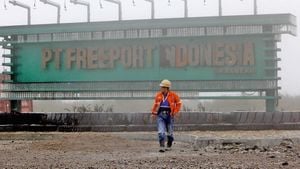German voters rendered their decision on Sunday, February 23, 2025, solidifying significant political changes within the nation as the conservative bloc of the Christian Democratic Union (CDU) and the Christian Social Union (CSU) emerged victorious. According to the exit polls conducted by ARD, the CDU/CSU secured approximately 29% of the vote, positioning them as the largest party after three years of opposition.
For the first time, the far-right Alternative for Germany (AfD) claimed second place with 19.5% of the votes, marking a substantial increase from their previous performance. The ruling Social Democratic Party (SPD), led by Chancellor Olaf Scholz, suffered losses, earning just 16% — their lowest since World War II. Meanwhile, the Greens garnered 13.5% and Die Linke garnered 8.5% of the vote.
The election results have triggered calls for coalition negotiations, as no party secured enough votes for an outright majority. Friedrich Merz, the CDU/CSU candidate, appeared best positioned to lead government formation efforts. Following the results, he expressed gratitude to voters: "Thank you for the trust you have placed in us and also in me personally – I understand the responsibility and the scope of the task ahead of me and I will face it with the greatest respect." Merz aims to establish a stable government capable of addressing challenges arising from recent European and global crises.
The AfD's surge reflects heightened voter dissatisfaction tied to issues such as immigration, energy costs, and public safety. Alice Weidel, the AfD's co-leader, reacted to their performance with enthusiasm, stating, "This is a historic success for us – our best result ever," and extended her hand for cooperation with the CDU/CSU. This raised alarm bells among many political observers, who note the potential dangers of far-right ideologies gaining traction.
Typically, the centrist parties have pledged to maintain their distance from the AfD, with the possibility of excluding them as coalition partners, complicates the pathway forward for Merz and the CDU/CSU.
Political analysts suggest the election outcome serves as a significant reprimand to the previous coalition government, which broke down amid disagreements on fiscal policies. Scholz called the result "a bitter defeat" but refrained from resigning, indicating potential resolve amid setbacks. He stated, "This is something we can never simply accept." The new government will be tasked with addressing not only internal economic challenges but also adapting to the pressing matters affecting Europe, particularly concerning the Ukraine conflict and immigration policies.
The election saw about 59 million people eligible to vote, with early statistics indicating turnout around 52% — relatively high for Germany. This participation reflects public engagement with the electoral process and dissatisfaction with recent developments.
Although the CDU/CSU has traditionally positioned itself against the AfD, the latter's notable performance signals changing voter dynamics within younger demographics. This shift is underscored by the AfD securing 22% of votes from those aged 25 to 34, surpassing the CDU/CSU's 18%. Such patterns demonstrate the electorate's growing frustrations, particularly among individuals who feel left behind economically and socially.
The immediate future will require Merz to navigate the waters of coalition-building delicately. Political experts have underscored the potential difficulties owing to diverging party ideologies, especially with the recent rise of populist factions. The emphasis on immigration during the campaign saw the CDU/CSU struggle to balance its responses without alienation, particularly as the AfD capitalized on this key issue to boost its appeal.
Recent violent incidents involving migrants have amplified tensions surrounding immigration discussions. The public's reaction to cracks within political unity surrounding this topic will be pivotal as the new government aims to stabilize and address public concerns.
Despite the challenges facing Merz, his focus on economic revitalization could be the cornerstone of his agenda. He has proposed plans for tax reforms aimed at cutting corporate taxes to stimulate growth. The approach could face significant resistance, dependent on the willingness of coalition partners to support reformative measures during negotiations.
Looking at the broader European perspective, the outcomes of these elections could influence Germany's role within the EU, especially concerning shared economic and security matters. With new leadership, Germany will face intensified scrutiny over its direction, particularly as the necessity for cohesive action grows amid worldwide uncertainties.
German citizens are holding their breath as the political scene appears transformative. The effectiveness of the CDU/CSU under Merz and the ability to form a stable government will determine not only Germany's domestic policies but also its future role within European and global politics. The stakes are high as the nation prepares to confront not just internal challenges, but also the broader ramifications of its decisions on the European stage.
While the new parliamentary composition evolves, political analysts remain alert to how these dynamics will reshape government strategies and collaborations. The 2025 elections have signified more than just numbers at the polls; they reflect the shifting sentiments of voters and the pressing need for parties to respond effectively to the nation's challenges.



